|
In recognition of Mental Health Awareness Month 2020, this May, ESPN highlights the stories of athletes, coaches and other sports figures managing their mental health and well-being. These stories reflect a broad range of subjects and experiences, including new challenges brought on by the coronavirus pandemic and social distancing. The hope is that these stories help raise awareness, provide information and improve understanding about mental health, how sports figures seek treatment and the approaches that work for them. Kevin Love: Coronavirus pandemic another reminder of importance of mental wellnessKevin Love is fretting about COVID-19. He's not spending a lot of energy worrying whether he'll get it, or grieving the death of someone close to him who contracted the coronavirus. He frets because he knows what can happen if people experience the loss of a loved one, become consumed with the loneliness of isolation, experience job insecurity and financial difficulty, and then internalize that stress instead of getting help by reaching out and talking to a health professional. Love has gradually peeled back the layers of how he has managed to continue to play basketball while taking a proactive -- and public -- approach to managing his mental health. A major part of his treatment, he says, is cognitive behavioral therapy, a problem-focused technique that centers on changing negative thoughts, beliefs, attitudes and behaviors, and providing coping strategies to help a person improve their ability to regulate emotional responses. But, Love discovered, cognitive behavioral therapy on its own wasn't enough for him. As ESPN's Jackie MacMullan writes, Love realized he needed to pair his treatment with medication. That comes with added scrutiny. Some of Love's NBA brethren, who he said could benefit from medication for a variety of mental health issues from ADHD to bipolar disorder, have rejected taking that step because they are embarrassed, consider medication a sign of weakness, or are afraid of the negative connotations associated with it and how it could affect their standing with the team. "I know some guys don't want to go there, but taking medication has changed my life in a big way," Love said. "It has helped me manage this ongoing feeling of irritability, this feeling in the pit of my stomach that I couldn't shake before. The medication helps me relax without sapping my energy levels."
Inside Roy Halladay's struggle with pain, addiction By 2013, Roy Halladay was 36 years old and winding down a Hall of Fame career. He'd pitched a perfect game and the second no-hitter in postseason history and was known in baseball circles as a stoic workhorse. But few knew about his private battle with addiction, depression and anxiety in the years leading up to his fatal Nov. 7, 2017, plane crash.
Katie Lou Samuelson on her mental health journey: 'I was in denial about how I felt'By Katie Lou Samuelson, as told to ESPN's Mechelle Voepel When I look back on when I was dealing with depression and anxiety, it feels like I was putting together a puzzle. Slowly at first, because until recently, I didn't understand exactly what I was working on. Last year, I realized I needed to ask for help. It wasn't one moment. I just felt so overwhelmed by any slightest inconvenience. Something small would go wrong, and I didn't know if I was going to break down crying or get very angry. I felt like I had no more control over my emotions. Finally, I reached out to my agent and figured out a plan. I was able to speak to a mental health professional, someone who had more knowledge than I did. When I started talking about things that I didn't think made sense, it made perfect sense to them. And I felt this weight lifted from me.
How the Big Ten is making mental health a growing priorityBig Ten commissioner Kevin Warren is taking the lead on mental health and making mindfulness for student-athletes a priority. Jeffrey Brown/Icon Sportswire via Getty Images Big Ten commissioner Kevin Warren speaks of mental fitness with the intent and enthusiasm of a motivational speaker. The message is powerful -- the message inherent in his decision to deliver it even more so. As ESPN senior writer Ivan Maisel explains, the first major public initiative of Warren's tenure as only the sixth Big Ten Conference commissioner is directed toward neither money nor academics, the poles that hold up the intercollegiate athletic tent.
Why a college football coach hid his bipolar disorder diagnosis for 30 years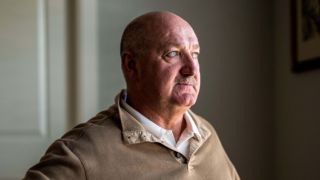 Kenneth Ruggiano for ESPN When Brent Guy found out he had bipolar disorder, the diagnosis brought not relief but, rather, years of hiding his truth. Now, Guy has found his true purpose: helping to break down the stigma that surrounds mental health.
How Hayden Hurst's response to mental illness changed his lifeHayden Hurst discusses how addressing his depression in college changed his outlook on life. When Atlanta Falcons tight end Hayden Hurst "hit rock bottom," he tried to take his own life. Now, as ESPN's Vaughn McClure writes, Hurst's mission is to dispel the stigma around mental health treatment.
On Behind The Racquet, Noah Rubin brings tennis players' mental, emotional challenges into focusNoah Rubin's idea was simple, combining his passion for tennis, photography and journalism. Athletes would pose for a picture hiding their faces behind the strings of their racket. Then, in their own words, they would reveal the human struggles behind chasing greatness. Within an hour he had a name, "Behind The Racquet." He quickly registered Instagram and Gmail accounts and purchased the URL www.behindtheracquet.com for $750. As ESPN's Wayne Drehs writes, Rubin is now leading a conversation about losing streaks, pressure and loneliness.
Michael Phelps: 'This is the most overwhelmed I've ever felt'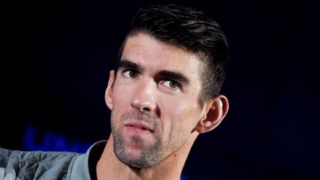 How are you? We are asked that question every day. But how often do we just say "fine" or "good" and move on? How often do we actually admit the truth -- to ourselves as well as others? You want to know my truth? How am I doing? How am I handling quarantine and the global pandemic? Put it this way: I'm still breathing. It has been one of those months. Nonstop, my mood jumping up and down and all around. The pandemic has been one of the scariest times I've been through. I'm thankful that my family and I are safe and healthy. I'm grateful we don't have to worry about paying bills or putting food on the table, like so many other folks right now. But still, I'm struggling.
Making mental health a priority during the pandemicESPN's Charlotte Gibson spoke with Rebecca Colasanto, a licensed clinical social worker and the system director of behavioral health for Bristol Health, about how to manage and respond to the anxiety and stress that come with these rare times. Colasanto shares how athletes, coaches and sport fans can cope and manage anxiety and stress during the outbreak of COVID-19.
How Hanna Hall's mental health battle gave her strength, Former Buffalo point guard Hanna Hall details her struggle with anorexia and her recovery process.
Inside the latest chapter of former Ohio State star Maurice Clarett's life turnaround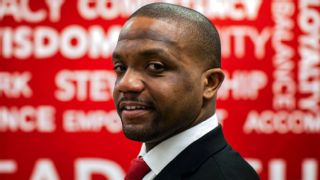 Michael F. McElroy for ESPN As ESPN senior writer Adam Rittenberg explains, Maurice Clarett, a former Ohio State Buckeyes legend, spent years in prison before working to get his life back on track. Clarett is now giving back and helping in the communities he always hoped to impact.
Brad 'Scar' Vaughn takes time away from gaming for better work-life balance Brad "Scar" Vaughn Provided by Carlton Beener/ESL Some might conclude that professional gamers live a dream, getting paid to play video games. But Brad "Scar" Vaughn, who most recently finished 9-12th place at the Final Kombat 2020 competition in Chicago, has dealt with depression as a gamer. As Brando Simeo Starkey writes for The Undefeated, Vaughn warns against the idea that the dream comes with no costs.
Vols QB Brian Maurer shares story to help others living with depression "My goal was not to bring attention to myself, but to bring attention to mental health," Tennessee QB Brian Maurer told ESPN's Chris Low. "It's something a lot of people struggle with. And not only younger people, but all people. They battle it every day and keep it a secret. My thinking was that if a college athlete can come out and speak about how seeking help is the most important thing you can do, then maybe all those people out there struggling will reach out to somebody and know that there is always hope."
Mental health and the NBA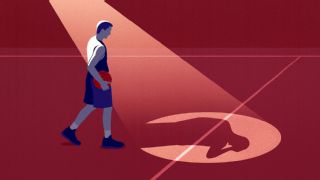 ESPN senior writer Jackie MacMullan explores mental health and the NBA in this five-part series that first appeared in August 2018.
Oh yes, there's Laughter Permitted ESPN In a special episode of the Laughter Permitted podcast, mental skills coach Colleen Hacker joins Julie Foudy and Lynn Olszowy -- at a safe social distance via Skype -- to share strategies used by elite athletes that can be applied to dealing with the anxiety and uncertainty surrounding the coronavirus outbreak. Hacker, an expert on the psychology of peak performance, works with professional and Olympic athletes in a variety of sports including the NFL, MLB, PGA, LPGA, U.S. swimming, U.S. speed skating, U.S. track and field, U.S. soccer and U.S. hockey. She offers her unique insights on how we can positively frame our mindsets, use laughter as the antidote to stress and view social distancing as an opportunity.
'We have to try to help each other'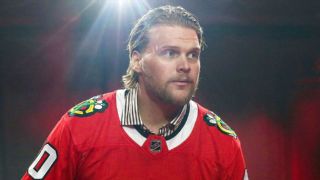 "You're not supposed to show your weaknesses or show defeat [in hockey]," Robin Lehner said. "It's a culture thing. We have to try to help each other, and it all comes back to education and being open. And that's why I talk about it."
Denied on the doorstep of the Final Four: Two shots she'll never forget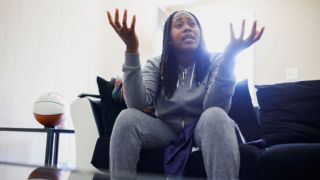 Dee Dee Jernigan was a senior at Xavier when she missed two wide-open layups in the final seconds in the 2010 Elite Eight. A decade later, she's learning to move past the pain. Melissa Golden for ESPN Xavier's Dee Dee Jernigan missed two wide-open layups in the final seconds in the 2010 Elite Eight. A decade later, ESPN's Josh Weinfuss writes, she's learning to move past the pain.
How the Hilinksi family is making an impact after their son's deathKym and Mark Hilinski discuss how by sharing the story of their son Tyler's death by suicide, they are trying to make a difference. After Tyler Hilinski ended his life in January 2018, ESPN senior writer Ivan Maisel and the Washington State quarterback's family were connected by a pain they hope we never understand.
Mental, physical health key during shutdown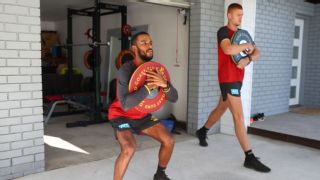 With on-field action shuttered for the foreseeable future, the AFL's Gold Coast Suns have turned their attention to ensuring players are in the best possible physical and mental shape ahead of a competition restart, Matt Walsh writes.
'I was just in a real bad place'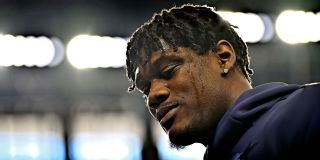 Andrew Hancock for ESPN Dallas Cowboys pass-rusher Randy Gregory sought help for depression, drugs and other issues. In this story by ESPN senior writer Elizabeth Merrill, which originally posted Dec. 4, 2018, he was playing football again, fighting to stay clean and trying to help his team to the playoffs.
After the hashtags, are you ready to listen?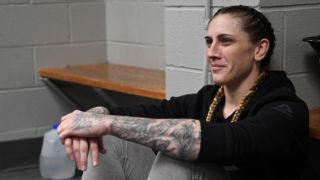 Lanesha Reagan says life after NCAA volleyball and far away from family and friends has been more difficult than she expected. Courtesy Lanesha Reagan In this first-person essay marking World Mental Health Day in 2018, former Oregon State volleyball player Lanesha Reagan shares how she started a movement at school with her candid blog about mental illness.
Megan Anderson: 'I was just so scared to do anything' UFC fighter Megan Anderson discussed her 2010 suicide attempt and subsequent depression in an interview on Ariel Helwani's MMA Show in late 2019.
Divided we dance, united we move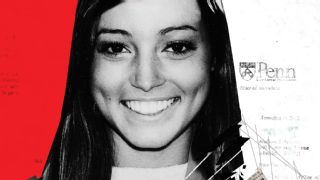 Ashleigh Hughes, left, and Tricia Cremeans created the high-intensity interval training dance class in 2013. Yasiris Torres You see them everywhere, homemade workout videos of people missing their long-lost classes now dancing or spinning or exercising alone. Living in the age of the coronavirus feels both hopeful and hopelessly lonely. Still, as ESPN senior writer Allison Glock shares in this essay, we find a way to dance together.
1994 Heisman Trophy winner Rashaan Salaam's burden to carry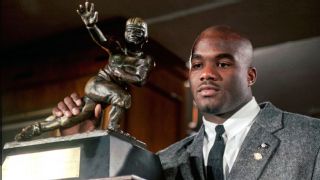 Heisman Trophy weekend is a special time to celebrate nominees and former winners. But for Colorado running back Rashaan Salaam, it represented another year of having to face the spotlight, of having to answer questions. On Dec. 5, 2016, five days before the Heisman presentation, in a park just a mile and a half from the University of Colorado, Salaam died by suicide. After nearly five months of investigating, the Boulder Police Department attempted to sum up Salaam's mindset on the day he took his own life: Friends and family saw instances when he seemed depressed and disappointed with how his life had gone. There were concerns over money, work and his involvement -- or lack thereof -- in the NFL and at the University of Colorado. As ESPN's Elizabeth Merrill writes, one question that will never be definitively answered is whether chronic traumatic encephalopathy contributed to his death. Multiple people interviewed for this story said Salaam exhibited symptoms of CTE, such as depression, headaches and memory loss.
The story of Madison Holleran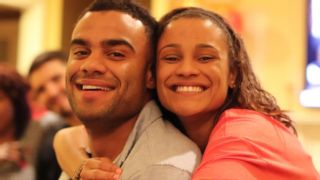 Lincoln Agnew for ESPN The Magazine On Instagram, Madison Holleran's life looked ideal: star athlete, bright student, beloved friend. But as Kate Fagan wrote in this 2015 story for espnW, the photos hid the reality of someone struggling to go on.
Solomon Thomas passionate in his fight for suicide preventionNFL defensive lineman Solomon Thomas is now a distinct and important voice in shining a light on the issues of mental health and suicide, writes ESPN's Nick Wagoner in May 2019. Ella Thomas, Solomon's sister, died by suicide on Jan. 23, 2018. She was 24.
|
